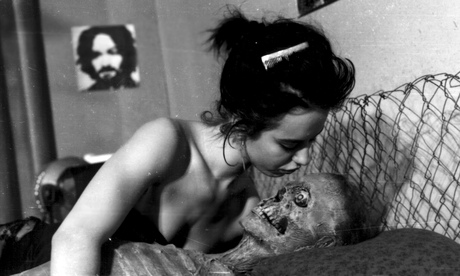
A well-timed wave of moral consternation can be a backhanded blessing for film distributors but, at least when it comes to horror, PR-by-public-outrage is increasingly hard to come by. Human Centipede managed it. Less likely the upcoming release of Nekromantik, a cult shock-flick from 1987 by German director Jörg Buttgereit.
Considered at the time one of the most transgressive films ever made and banned in many countries, Nekromantik was never available on home video in the UK. Now, Arrow Films is releasing the uncut version in November. The film is also part of this year's Scalarama and will be showing at venues nationwide during September. For all the girl-boy-corpse action, however, it's unlikely many will quibble the British Board of Film Classification's decision to grant it an 18 certificate.
"Unless we decide to do a cover-mount DVD on a tabloid, which will obviously never happen, who's going to be offended?" says Arrow Film's Francesco Simeoni.
The ease with which Nekromantik sailed past BBFC censors contrasts with the battle Arrow faced last year over the release of another vintage classic, Radley Metzger's Score (1974). A whimsical, tongue-in-cheek jaunt through the lives of two couples in an idyllic coastal town, Score is, in places, explicit, but mainly it is humorous and self-aware. Metzger is widely recognised as one of the most important film-makers to work in erotic cinema – other films, Camille 2000, The Lickerish Quartet and The Opening of Misty Beethoven are classics of their genre – and the director, now in his 80s, has just had a retrospective at New York's ultra-establishment Lincoln Centre.
Nevertheless, Score, in its uncut version, was denied an 18 certificate by the BBFC on the grounds of an unsimulated fellatio scene. After appealing to the board three times, Arrow was forced to release a version Metzger had previously cut for the more prudish states in the US.
"The BBFC's decision was a big surprise," says Simeoni. "We expected Score to go through. The BBFC classified it as a sex work, which means it's designed to titillate in the same way as pornography, but the film isn't porn."
Releasing an edited version of any film is problematic for distributors. Works are tainted if even a few seconds have been cut, and with physical media sales already on the brink and uncut versions at viewers' fingertips, the UK industry can ill afford for films to be relegated to the R18 ghetto (available only at licensed premises).
There are wider issues at stake. Julian Marsh, founder of the Erotic Film Society, believes that while the BBFC is becoming more liberal when it comes to violent and deliberately shocking content, it is as illiberal as ever regarding works that are sexually explicit.
"Films which were once considered to have no value – or even capable of corrupting – have been re-evaluated over the years. Nekromantik is just one example," says Marsh. "But when it comes to films from the porno-chic era of the 1970s and 80s, re-evaluation seems to have stalled."
For those who've seen Lars von Trier's Nymphomaniac, which is explicit, albeit featuring porn doubles, prosthetic vaginas and special effects, Michael Winterbottom's 9 Songs, chock-full of unsimulated penetration, oral sex and ejaculation scenes, or Vincent Gallo's The Brown Bunny, with its unsimulated sex scene between Gallo and Chloë Sevigny, Marsh's accusation may sound harsh. But what separates these films from Score?
In practice, the BBFC does allow unsimulated, explicit sex in 18-rated films, but only if it decides those films are not sex works. If a film is considered a sex work and features "real" sex, it will be banished to the naughty step of the R18.
"We define a film as a sex work if its primary purpose is sexual arousal or stimulation," says David Austin, assistant director of the BBFC. "We ask what the film-maker's purpose is in presenting sex in the way they do."
If the purpose is deemed serious, boundaries can be pushed. Hence the BFI's compilation of Peter de Rome's pioneering gay movies was granted an 18 certificate, despite the director happily labelling his own work porn. Some believe the fine line between a film about sex and a sex work is illogical.
"If an act in a film with 'artistic intent' is acceptable, why should the same act, depicted in a context that is just for sexual entertainment, be considered less valuable?" says Myles Jackman, a lawyer who specialises in pornography and obscenity offences. "It's cultural snobbery; the BBFC as arbiters of taste."
In fairness, the BBFC does not operate in a vacuum. It has to abide by laws governing pornography and reflects public opinion as best it can, carrying out major public consultations every four years. If BBFC rulings then are a product of social mores, as well as the board's arguably subjective decisions about what constitutes a sex work, what does it say about us as a society?
Metzger and his legions of fans will baulk at calling Score a sex work, but, even if the designation holds, is the intent to sexually arouse really so troublesome? It's hard to argue that Nekromantik, with its visceral grossness, sets out to satisfy the loftiest side of human nature. The underlying ethos seems to be that, if something has been made with the intention of being sexually arousing, it should be treated more severely than even the most taboo-breaking activities – corpse-screwing, for example – when portrayed in any other context.
• Scratch'n'sniff seats: can repertory cinema be rescued from multiplex hell?

